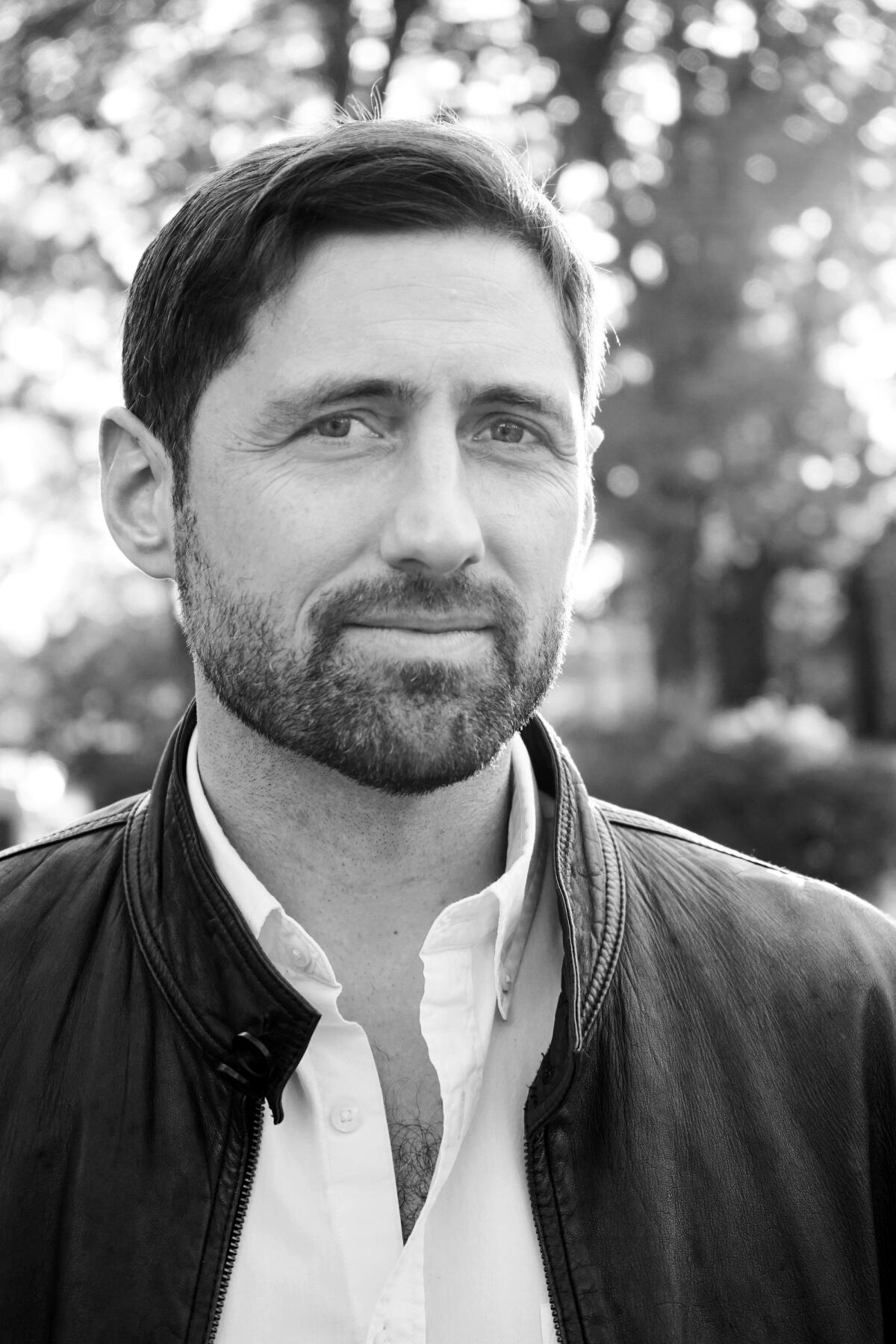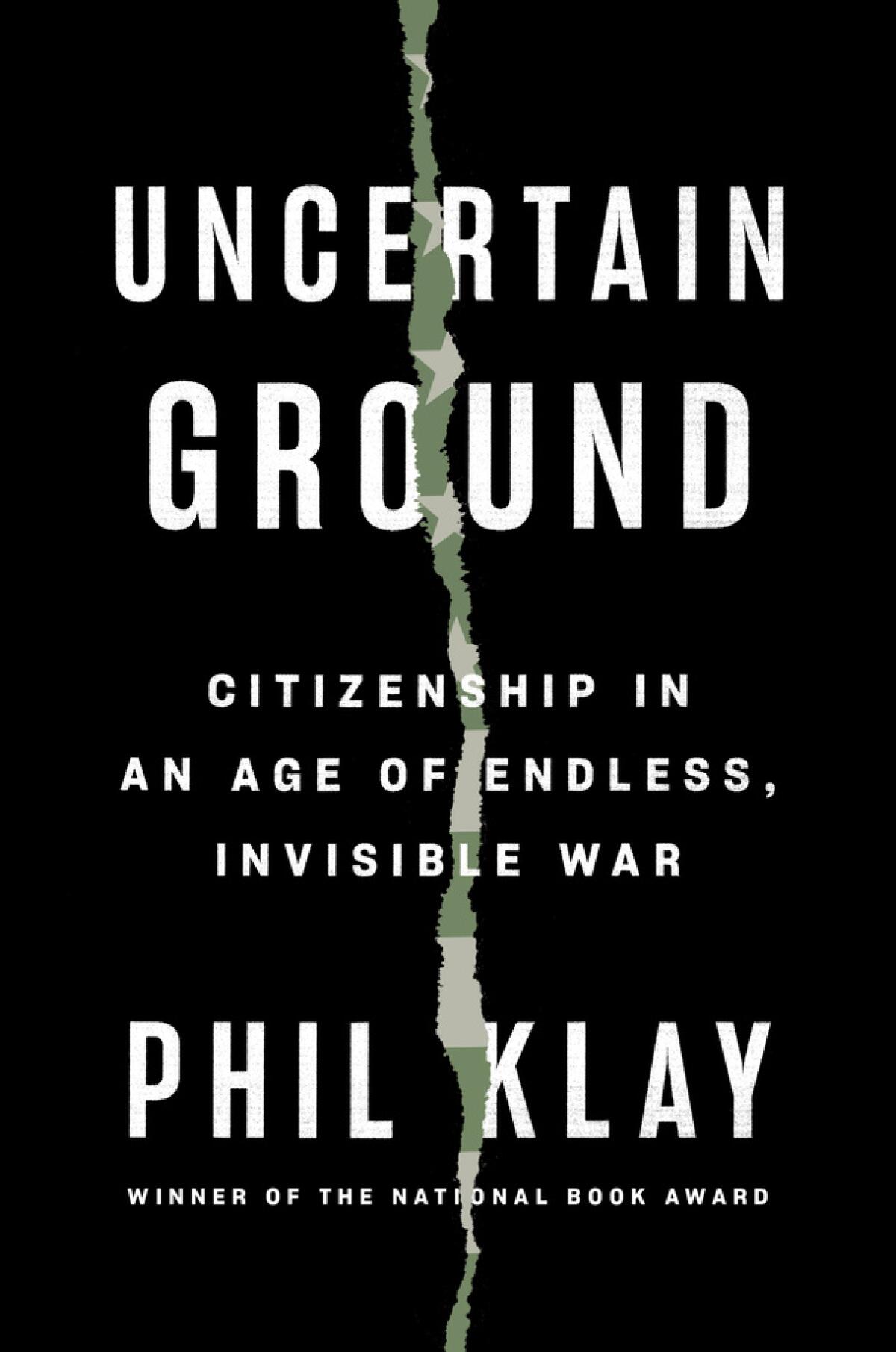How can a country always at war ever find peace? Author Phil Klay keeps asking

- Share via
On the Shelf
Uncertain Ground: Citizenship in an Age of Endless, Invisible War
By Phil Klay
Penguin Press: 272 pages, $27
If you buy books linked on our site, The Times may earn a commission from Bookshop.org, whose fees support independent bookstores.
A certain lexicon emerged over the course of America’s wars in Iraq and Afghanistan, one that tended to obscure more than it revealed. The terminology of a global war on terror that endorsed “enhanced interrogation” techniques engulfed state-sanctioned horrors in a nebulous cloud of meaninglessness.
Other terms that had once seemed clear suddenly became fuzzy. One of these — citizenship — is what most interests Phil Klay, the National Book Award-winning fiction writer and Marine veteran, in the essays collected in his new book, “Uncertain Ground.” If participation in foreign policy isn’t required of its citizens, what do America’s wars say about its people and the shifting politics that shield them from consequence?
Questions like these are nothing new for Klay, whose fiction animates the headlines of America’s war in Iraq (“Redeployment”) as well as its geopolitical adventurism in Colombia (“Missionaries”). The scope of industrial-scale warfare allows for plenty of room to critique foreign policy and dispute cultural myths. In the fiction of “Redeployment,” Marines find power drills used by insurgents to torture Iraqi prisoners while artillery crews fire upon targets they never see up close. In the essays, these details are merely the raw material for inquiries that reach deeper down into American bedrock.
Each of these pieces, which were published over the last decade in outlets ranging from the New Yorker to Time magazine, is presented here as an independent struggle to find meaning on its own terms. Still, there is a sense of progression from one to the next. Klay is certainly no fan of the war machine — nor is he a pacifist — but he proves too wise a writer to fall for the trap of prescribing what others should think or feel about American military action. Instead, early essays in which he asks himself how he should feel about his experiences set the stage for bigger ideas.
Klay, a veteran and author of the National Book Award-winning story collection “Redeployment,” follows up with the rich, complex novel “Missionaries.”
Klay’s warnings against neatly packaged explanations can risk sounding obvious, though the keenness of his observations is unmatched. “The exercise of violence, unlike the accumulation and use of power, offers a satisfying narrative structure,” he writes in “Man of War.” “A raid is a morality play with a beginning, middle, and end, in which a set of brave warriors prepares for battle, strikes their objective, and ends the life of a bad guy.” It’s a concise summary of so many war stories manufactured for easy public consumption. Such tales feed our hunger for what feels like moral clarity; Klay searches instead for the real thing.

Though these pieces were written over several years, reading them together positions them into an inevitable conversation with one another. Leitmotifs emerge through repetition of stories and images. The authorization of use of military force, a blanket concession of war powers passed by Congress in 2001, appears often enough as a phrase to be its own throughline. In more than one essay, the German author Ernst Jünger, a veteran of both world wars, likens throwing hand grenades to ballet. Reading it all together is a little like watching a stand-up comic work through the same jokes on different nights; the brilliance of the feat is both deepened and dampened in the repetition. The illusion of spontaneity is lost.
And yet a larger theme emerges — along with a point of view. The vocabulary of truth and authority is a prerequisite for understanding citizenship. When the veteran voices in one essay can’t seem to agree on a shared concept of truth about the nature of war, Klay makes his own opinion clear by giving the final word to Walter Benjamin, a man who translated Baudelaire rather than fight in World War I. By conjuring Benjamin’s criticism of the “heroic spirit” of his time to contradict Jünger’s view from inside the trenches, Klay hints at where authority may lie: “Not in the lived experience of war, nor in the penetrating yet isolate truths of individual artistic geniuses, nor in the aggregated opinions of a given mass of veterans, but in a careful reader possessed of a vision of peace.”
It’s a philosopher’s answer to writing about war — more concerned with posing questions to society than extracting answers from the fog of battle.
John Musgrave, a disillusioned Vietnam vet, trades war stories with Jerad Alexander, who grew up fighting America’s modern ‘forever war.’
Part of what gives these essays momentum is the tapestry of references Klay weaves together. A single paragraph cites Mao, Frantz Fanon, James Madison and Hannah Arendt in response to a Simone Weil quote that defines force as “that x that turns anybody who is subjected to it into a thing.” The effect can feel dizzying even if you recognize all the names.
These references never slow things down; on the contrary, they raise the stakes. An essay that looks at America’s history of gun violence begins, “America’s first recorded murderer arrived on the Mayflower, and his weapon of choice was a gun.” From there, the story of John Billington turns into a portrait of America’s lucrative firearms industry and the cultural myths that feed it. An essay in the section titled “Faith” recounts how rapid-fire cannons wounded St. Ignatius, leading to an inquiry into the “strange and terrible blessing” that accompanies his suffering (along with more Jünger quotes). Here, Klay chooses Catholic terminology to organize his thoughts about trauma in terms of guilt, redemption and grace.
The author hybridizes many forms of nonfiction to explore questions people have been asking about war for centuries. Reflections on esoteric history run alongside (and resonate with) more topical commentary on, for instance, the assassination of Iranian Gen. Qassem Suleimani and the downfall of Navy SEAL-turned-Missouri governor Eric Greitens. Incorporating reportage, political commentary and cultural criticism, he defies neat categories just as he upends neat war narratives.
Klay accomplishes the latter by facing those narratives head-on. In places, he resurrects snapshots of American pride in the immediate wake of 9/11. Rather than try to forget or dismiss them in the light of hindsight, Klay amplifies their discomfort by elaborating on the emotional charge of the precise moment. A flash of unity mixed with grief, rage and, as Klay writes, “Something dangerously seductive. America had found moral purpose again.”
Bethanne Patrick’s May highlights include new fiction by John Waters, Chris Bohjalian and Emma Straub, fresh David Sedaris, breakout poetry and more.
With this collection, Klay transcends his self-description as “a writer who was once a Marine and writes about war” to become more of a philosopher. He uses war to pose urgent questions about political identity and personal faith that will endure long after the narratives of recent conflicts get revised and their terminology fades into history.
In doing so, Klay serves his country in a way he never could while still in the military — this time as a writer with insight and, in every sense, a citizen.
Joe Stanek is a veteran who writes about military culture.
More to Read
Sign up for our Book Club newsletter
Get the latest news, events and more from the Los Angeles Times Book Club, and help us get L.A. reading and talking.
You may occasionally receive promotional content from the Los Angeles Times.









